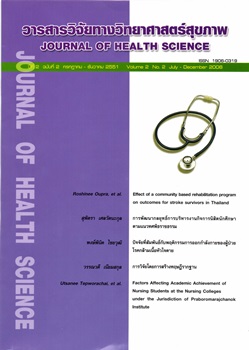Effect of a community based rehabilitation program on outcomes for stroke survivors in Thailand
Main Article Content
บทคัดย่อ
บทคัดย่อ
โรคหลอดเลือดสมองหรือที่นิยมเรียกกันว่า “Stroke” ในทางการแพทย์มักจะเรียกกันว่า CVD “Cerebrovascular disease” นั้น เป็นหนึ่งในสาเหตุหลักที่ทำให้ผู้ป่วยเสียชีวิตทั่วโลกประมาณ 20 ล้านคนต่อปี (องค์การอนามัยโลก, 2542; เมนดิส และ คณะ, 2547) ผู้ป่วยโรคหลอดเลือดสมองหากรอดชีวิตมักมีความพิการหลงเหลือ ส่งผลกระทบต่อร่างกาย จิตใจ และสังคมของผู้ป่วย ทั้งนี้ เนื่องจากการกลับไปใช้ชีวิตที่บ้าน ผู้ป่วยจำเป็นต้องได้รับการดูแลจากผู้อื่นอย่างต่อเนื่อง เนื่องจาก ความสามารถในการปฏิบัติกิจวัตรประจำวันที่จำกัด ส่งผลให้ผู้ป่วยเกิดปัญหาด้านจิตใจ ดังนั้น จึงมีความจำเป็นที่ญาติผู้ให้ การดูแลผู้ป่วยที่บ้านมีความรู้และทักษะในการดูแลผู้ป่วย เพื่อที่จะสามารถให้การดูแลผู้ป่วยได้อย่างถูกต้อง ป้องกันการเกิด ภาวะแทรกซ้อน
การศึกษาครั้งนี้มีวัตถุประสงค์เพื่อสร้างและทดลองการใช้โปรแกรมการพยาบาลระบบสนับสนุนสำหรับญาติ หรือ ผู้ให้การดูแลผู้ป่วยโรคหลอดเลือดสมองที่บ้าน (SELF) ประเมินผลประสิทธิภาพของโปรแกรมการพยาบาลระบบสนับสนุน สำหรับญาติ หรือผู้ให้การดูแลผู้ป่วยในการฟื้นฟูสภาพร่างกายผู้ป่วยที่บ้าน และลดภาวะแทรกซ้อนในผู้ป่วย การศึกษาครั้งนี้ เป็นการศึกษาแบบทดลองเปรียบเทียบผู้ป่วย 2 กลุ่ม จากโรงพยาบาล 2 แห่ง เก็บข้อมูลก่อนและหลังการใช้โปรแกรมการทดลอง โดยเปรียบเทียบระหว่างกลุ่มควบคุมและกลุ่มทดลอง กลุ่มทดลองได้เข้าโปรแกรมพัฒนาความรู้ &เกทักษะในการดูแลผู้ป่วย และ ให้คำแนะนำทางโทรศัพท์หลังจำหน่ายทุก 1 เดือน เป็นระยะเวลา 3 เดือน
ผลการศึกษาพบว่า หลังจากจำหน่ายกลับบ้านครบ 3 เดือน ผู้ป่วยโรคหลอดเลือดสมองในกลุ่มทดลองมีประสิทธิภาพ การทำงานของร่างกายดีกว่ากลุ่มควบคุมอย่างมีนัยสำคัญทางสถิติ (Bl f = 2.43, P = 0.017; mRS z = 3.176, p = .001) และ มีการกลับเข้ารับการรักษาเนื่องจากภาวะแทรกซ้อนน้อยกว่ากลุ่มควบคุม (กลุ่มทดลอง ท =10 [14.3%]: กลุ่มควบคุม ก = 34 [48.6%]) จากผลการศึกษาครั้งนี้ทำให้กล่าวได้ว่าการให้การฟื้นฟูสภาพร่างกายแก่ผู้ป่วยโรคหลอดเลือดสมองอย่างมีแบบแผน โดยการใช้โปรแกรมการพยาบาลระบบสนับสนุนสำหรับญาติโดยให้ความรู้และทักทักษะ มีผลอย่างมีนัยสำคัญทางสถิติในการ ฟื้นฟูสภาพร่างกายผู้ป่วย และป้องกันภาวะแทรกซ้อน
คำสำคัญ : อัมพาต; ผู้ป่วย; ผู้รอดชีวิต; การฟื้นฟู; โรคหลอดเลือดสมอง; การให้ความรู้
Abstract
Stroke is the leading cause of death worldwide (WHO Guidelines Subcommitte, 1999) attributing to thedeath of around 20 million people a year (Mendis et al., 2004). Stroke suruivors usually have some degree ofdisability which makes the condition a particularly costly disorder for individuals, the health system and society.
Returning home or to the community can be atraumatic experience for stroke survivors. lt is vitallyimportant that family caregivers have sufficientknowledge and skills to provide appropriate care toassist the stroke survivors to avoid complications andto overcome their functional deficits. This study aimsto (i) develop and implement a nurse led supportiveeducative learning programme for family caregivers(SELF) of stroke survivors in Thailand, (ii) evaluate theeffect of the SELF programme on functional ability ofstroke survivors and (iii) reduce the incidence ofcomplications among stroke survivors in Thailand. Thisstudy was a comparative study with concurrentcontrols, using a two-group pre-test and post-testdesign and was conducted in two hospitals in differentcities in Thailand. The intervention groups receivedtraining program (SELF) that comprises didacticeducation sessions, hands on training for familycaregivers, a booklets and three follow-up phone calls.The findings demonstrated that stroke survivors in theintervention group scored better for functionaloutcome at three months follow-up (Bl t = 2.43,p = 0.017; mRS Z = 3.176, p =.001), and had fewerreadmissions for the management of stroke relatedcomplications (intervention n =10 [14.3%]: controln = 34 148.6%l). Consequently, this research hasdemonstrated that a structured rehabilitation skillseducation programme for family caregiver of strokesurvivors can significantly improve the functionalstatus of stroke survivors and prevent development ofthe common complications.
Keywords: stroke; stroke survivors; rehabilitation; education
Downloads
Article Details
บทความที่ได้รับการตีพิมพ์เป็นลิขสิทธิ์ของวิทยาลัยพยาบาลบรมราชชนนี จังหวัดนนทบุรี
ข้อความที่ปรากฏในบทความแต่ละเรื่องในวารสารวิชาการเล่มนี้เป็นความคิดเห็นส่วนตัวของผู้เขียนแต่ละท่านไม่เกี่ยวข้องกับวิทยาลัยพยาบาลบรมราชชนนี จังหวัดนนทบุรี และคณาจารย์ท่านอื่น ในวิทยาลัยฯ แต่อย่างใด ความรับผิดชอบองค์ประกอบทั้งหมดของบทความแต่ละเรื่องเป็นของผู้เขียนแต่ละท่าน หากมีความผิดพลาดใด ๆ ผู้เขียนแต่ละท่านจะรับผิดชอบบทความของตนเองแต่ผู้เดียว


